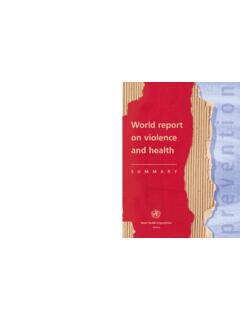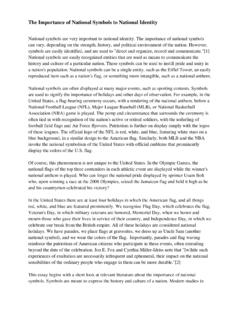Transcription of Urban Informality - UrbanPolicy
1 147 Urban InformalityToward an Epistemology of PlanningAnanya RoyMany of the significant Urban transfor-mations of the new century are takingplace in the developing world. In par-ticular, Informality , once associated withpoor squatter settlements, is now seenas a generalized mode of metropolitanurbanization. This article focuses onurban Informality to highlight the chal-lenges of dealing with the "unplannable" exceptions to the order of formal ur-banization. It argues that planners mustlearn to work with this state of policy epistemologies are usefulnot only for "Third World" cities butalso more generally for Urban planningconcerned with distributive Roy is an assistant professor inthe Department of city and RegionalPlanning, University of California,Berkeley. She is author of city Requiem,Calcutta: Gender and the Politics ofPoverty (University of Minnesota Press,2003) and co-editor of Urban Informal-ity: Transnational Perspectives from theMiddle East, South Asia, and LatinAmerica (Lexington Books, 2004).
2 Herlatest project is titled "The New GlobalOrder of Poverty Management: Data,Debt, and Discipline."Journal of the American Planning Associarion,Vol. 71, No. 2, Spring 2005. American Planning Association, Chicago, study of cities is today marked by a paradox: much of the Urban growthof the 2ist century is taking place in the developing world, but many ofthe theories of how cities function remain rooted in the developed is much discussion in academic circles about whether the time has cometo move from the Chicago school of Urban sociology to the Los Angeles schoolof postmodern geography (Dear, 2002), and yet, as Urban sociologist DouglasMassey (2001) recently commented, the Urban future lies neither in Chicago norLos Angeles; it instead lies in "Third World" cities like Rio de Janeiro, Mumbai,Hong Kong. beyond this mundane fact of Urban growth is also the pressing issueof what might be learned by paying attention to the Urban transformations of thedeveloping world.
3 This is not simply an issue of the inappropriateness of Euro-American ideas for Third World cities. Planning practices are constantly borrowedand replicated across borders. To attempt to stem this tide is rather useless andindeed under some circumstances can mark a turn to isolationism. Instead, I aminterested in what it means to locate the production of theory and policy in thecities of the developing an important article, Jennifer Robinson (2002) shows how the field ofurban studies is constituted through a dualit)': global cities versus cities are conceptualized as First World command nodes of a global systemof informational capitalism, "models" for the rest of the world (Robinson, 2002,pp. 547-548). In contrast, megacities, located primarily in the Third World, areconceptualized in terms of crisis "big but not powerful" (Robinson, 2002, ).
4 There is an urgency for Urban studies and planning to move beyond thedichotomy of First World "models" and Third World "problems." One possibleroute is through policy approaches that seek to learn from Third World cities(Roy, 2003b; Sanyal, 1990).In this article, I trace such a route by discussing one key theme of ThirdWorld research: Urban Informality and policy responses to Informality , suchas slum upgrading and land titling." My goal is not so much to evaluate thesepolicies as it is to highlight some of the distinctive challenges and paradoxes thatthey present for planners. Three are of particular importance: how planningmodalities can produce the "unplannable" Informality as a state of exceptionfrom the formal order of urbanization; how this state of exception can in turn bestrategically used by planners to mitigate some of the vulnerabilities of the urban148 Journal of the American Planning Association, Spring 2005, Vol.
5 71, No. 2poor; and how dealing with Informality requires recogniz-ing the "right to the city " claims and appropriations thatdo not fit neatly into the ownership model of property. Iargue that such issues are of relevance not only in ThirdWorld contexts but also to American planners concernedwith distributive FrameworkInformality is back on the agenda of international de-velopment and Urban planning. Not only is there growingrecognition that informal work and housing constitute sig-nificant proportions of Urban economies, but there is also aflurry of high-profile policies being pursued by internationalagencies and Third World city governments to manageinformality. Two contrasting frames dominate the currentdiscussion of first comes from the report of the Urban 21, an ex-clusive group appointed as a World Commission in the year2000, and published by Sir Peter Hall and Ulrich Pfeiffer(2000) as a book entitled Urban Future 21: A Global Agendafor 2ist Century Cities.
6 Hall and Pfeiffer pay particular atten-tion to one category of urbanization that they call "informalhypergrowth" cities. Expressing great concern for these ex-ploding and swollen cities, they argue that this phenome-non is not simply restricted to the cities of the global southbut that through migration, "some cities of the developedworld are invaded by the developing world" (p. 129) ren-dering them ungovernable. In contrast with this languageof crisis, Hernando De Soto (2000), in his supersellingbook The Mystery of Capital, presents an image of infor-mality as "heroic entrepreneurship." With the ear of manyof the Third World's political leaders, he continues a themethat he sounded in his first book. The Other Path (1989):that the "informal economy is the people's spontaneousand creative response to the state's incapacity to satisfy thebasic needs ofthe impoverished masses" (p.)
7 14).At first glance, these two frames one of crisis andthe other of heroism seem to be sharply at odds with oneanother. Yet a closer look reveals some striking example, both view Informality as fundamentally sep-arate from formality. Hall and Pfeiffer (2000) argue thatthe Urban poor of the year 2000 have "built their own citywithout any reference whatsoever to the whole bureaucraticapparatus of planning and control in the formal city nextdoor" (p. 15). De Soto sees the informal sector as closed offfrom the formal sector through a "legal apartheid ," withthe poor unable to trade their assets in the formal system ofcapitalist transactions.^ Implicit in this notion is the prom-ise that the informal sector will eventually be integratedinto a modern and manageable economy. Such is De Soto'scall for legalization, the assurance that once the assets oftheinformal sector are formally and legally recognized, capital-ist prosperity will flow into every corner of the frameworks yield many problematic corollarypropositions.
8 The first is the equation of Informality withpoverty. Neither frame recognizes how Informality mightbe a differentiated process embodying varying degrees ofpower and exclusion. Second, both frames conceptualizeinformality, and poverty more generally, as caused by iso-lation from global capitalism. Hall and Pfeiffer (2000), forexample, describe the informal sector as a totally localizedcollective subsistence economy, failing to note that someof the case studies they cite, such as Seabrook's work in theDharavi slum of Bombay, show that slum dwellers manu-facture products for global markets. Third, within suchframes it becomes possible to devolve responsibility forpoverty to the poor themselves. Hall and Pfeiffer, and DeSoto converge on the idea of enablement, helping the poorhelp themselves. This celebration of self-help obscures therole of the state and even renders it unnecessary.
9 As Jessop(2002) argues, at a moment of neoliberalism, when statesare pursuing austerity policies, such models of neocom-munitarianism legitimate the agenda of are many arguments that can be marshalledagainst the frames of crisis and heroism. However, I holdthat these critiques must be subsumed within a more sub-stantial conceptual disagreement, one that rejects the notionof an informal sector and instead views Informality as amode of urbanization. Along with Nezar AlSayyad, I haveused the term Urban Informality to indicate an organizinglogic, a system of norms that governs the process of urbantransformation itself (Roy & AlSayyad, 2004). Against thestandard dichotomy of two sectors, formal and informal,we suggest that Informality is not a separate sector butrather a series of transactions that connect different econ-omies and spaces to one another.
10 ' The term mode, derivedfrom the Latin modus, which interestingly is also the rootof other keywords like modern and model, means manner,form, or method. In metaphysics, it is a way ofbeing. Inlogic, it is expressed as modality or the form of a proposi-tion. Let me briefly outline how this notion of informalityas a mode rather than a sector helps reveal some key con-temporary trends of as a Mode of MetropolitanUrbanizationIt is well established that informal housing not onlyhas use value but also exchange value (Ward, 1982). InRoy: Urban Informality149 Other words, informal housing is a distinctive type ofmarket where affordabihty accrues through the absenceof formal planning and regulation (Baross, 1990; Dowall,1991). In recent years, it has become obvious that informalhousing and land markets are not just the domain of thepoor but that they are also important for the middle class,even the elite, of Second World and Third World cities(Roy & AJSayyad, 2004).




